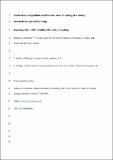Local mate competition modifies the costs of mating in a mostly monandrous parasitoid wasp
Abstract
The costs and benefits of mating are frequently measured in order to understand why females mate multiply. However, to separate the factors that initiate the evolution of polyandry (from monandry) from the factors that maintain it, we must ascertain how the environmental context changes the economics of mating. Here, we show how context-dependent costs of mating can lead to the evolution of polyandry in a species that is monandrous in the wild, the parasitoid wasp Nasonia vitripennis. We have previously shown that when females have insufficient time between mating and gaining access to hosts for oviposition, they appear unable to process sperm effectively and end up overproducing sons (i.e., laying unfertilized eggs, since Nasonia is in haplodiploid). This overproduction of sons is costly due to selection on sex allocation in this species. Although N. vitripennis is monandrous in the wild, polyandry evolves under laboratory culture despite this sex allocation cost. In this study, we show why: When groups of females oviposit together, as they do in laboratory culture, selection on sex allocation via local mate competition (LMC) is reduced, increasing the reproductive value of sons. This relaxes the fitness cost of male production. Overproduction of sons still occurs, but it is penalized less in terms of fitness than when females oviposit alone, under high LMC conditions, as they typically do in the field. Our results highlight how the costs and benefits of mating can vary under different ecologically relevant conditions, in this case the spatiotemporal distribution of resources and competitors, promoting the evolution of polyandry from monandry, and vice versa.
Citation
Boulton , R A , Cook , N , Greenway , E V , Glaser , G L , Green , J & Shuker , D M 2019 , ' Local mate competition modifies the costs of mating in a mostly monandrous parasitoid wasp ' , Behavioral Ecology , vol. 30 , no. 2 , pp. 417-425 . https://doi.org/10.1093/beheco/ary181
Publication
Behavioral Ecology
Status
Peer reviewed
ISSN
1045-2249Type
Journal article
Description
This work was supported by a Natural Environment Research Council (NERC) Doctoral training studentship to R.A.B.Collections
Items in the St Andrews Research Repository are protected by copyright, with all rights reserved, unless otherwise indicated.

